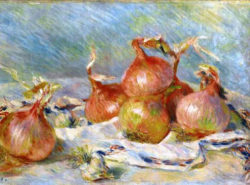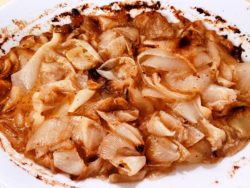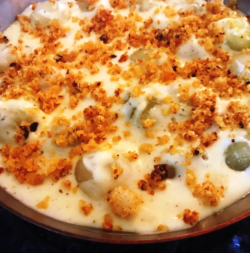Read Time: 3 Minutes Subscribe & Share
Burning Questions
 I love Brussels sprouts, and I love onions (not so crazy about sweet potatoes with brown sugar and marshmallows), and thus, I remain curious as to why Brussels
I love Brussels sprouts, and I love onions (not so crazy about sweet potatoes with brown sugar and marshmallows), and thus, I remain curious as to why Brussels Sprouts became the new darling in restaurant and carry out menus, but onions have yet to qualify. Of course, I’m also baffled that a slab of cauliflower —another mistreated vegetable — is grilled in a haphazard manner and listed as a vegetarian steak. Food trends are puzzling.
Sprouts became the new darling in restaurant and carry out menus, but onions have yet to qualify. Of course, I’m also baffled that a slab of cauliflower —another mistreated vegetable — is grilled in a haphazard manner and listed as a vegetarian steak. Food trends are puzzling.
So, onions. What happened to sink this vegetable, immortalized by Auguste Renoir and Beatrix Potter, from a standard creamy and comforting Thanksgiving side dish along with mashed potatoes and Brussels Sprouts, to barely an Instagram Hashtag (slightly over 100 versus 904,000 for Brussels Sprouts, according to the Insta-minions)
Bringing Back A Tradition
Although native American Indian tribes used strains of wild onions for poultices, syrups and even toys, the ones that we know and cook with today were brought over to the New World via European immigrants on ships, including, it is documented, the Mayflower. There is no mention of Brussels Sprouts being in the hold of that legendary vessel. The tradition of creamed onions in the US has its origins in English cooking and not French. I have read that the advent of frozen white onions, which like most frozen foods were very seductive to postwar American families, led to the demise of creamed  onions. Having tried cooking with the tiny frozen ones, I’m not shocked. They are indeed bland and watery and look somewhat forlorn in a pool of indeterminate white sauce.
onions. Having tried cooking with the tiny frozen ones, I’m not shocked. They are indeed bland and watery and look somewhat forlorn in a pool of indeterminate white sauce.
Aside from the nifty technique for onions from Paula Peck which she learned from her neighbor, Mrs. Rudski, I hope you try either of these recipes, and not only for Thanksgiving. They are especially lovely with roast chicken or pork during the dreary JanFebs. The first is from Felix Benoit, a marvelous food writer from Lyon, France. He researched and refined many local Lyonnaise dishes in his cookbooks. I discovered the Benoit recipe in the now AOOP (Alas Out Of Print) book from Patricia Wells, Bistro Cooking which we use so much that we have two copies. The crown creamed-onion jewel – and my husband’s absolute favorite – is this one in Sarah Leah Chase’s Nantucket Open House Cookbook, published in 1987 and now also AOOP.
hope you try either of these recipes, and not only for Thanksgiving. They are especially lovely with roast chicken or pork during the dreary JanFebs. The first is from Felix Benoit, a marvelous food writer from Lyon, France. He researched and refined many local Lyonnaise dishes in his cookbooks. I discovered the Benoit recipe in the now AOOP (Alas Out Of Print) book from Patricia Wells, Bistro Cooking which we use so much that we have two copies. The crown creamed-onion jewel – and my husband’s absolute favorite – is this one in Sarah Leah Chase’s Nantucket Open House Cookbook, published in 1987 and now also AOOP.
Apparently I never make enough of her version, as there are never any leftover creamed onions after Thanksgiving. Plenty of leftover turkey, mashed potatoes and Brussels Sprouts, though. She wrote another well-worn cookbook that lives in my kitchen, titled Cold Weather Cooking, and I pull out both every year for planning holiday meals, ever since they were first published over thirty years ago. Here’s hoping to elevate onion adoration to kale-like altitudes!


- 2.2lbs (1kg) large sweet onions - white preferred
- 3 tablespoons (44ml) crème fraiche- - heavy cream may be substituted
- Generous amount of freshly grated nutmeg
- Freshly ground pepper and sea salt
- Preheat oven to 375F (170C)
- Remove the stem but not the root of each onion, as that will hold the whole onion together.
- Remove the skin and possibly the top layer of each onion as needed.
- Place them in a pot of boiling salted water and cook them uncovered until they are completely soft but not falling apart, which can take from 20 to 40 minutes, depending on the size of the onions.
- Allow the onions to cool thoroughly before slicing into large even rounds. - about three to four for each onion.
- I dry my slices in a towel laid out, and then fold the towel over the top of the slices and press lightly.
- In a large bowl, toss the onions gently with the crème fraiche and lots of salt, pepper and grated nutmeg - I taste the mixture to make sure it is where I want it taste wise.
- Butter a 10 inch (23cm) gratin dish - it can be metal, ceramic or glass - and spoon in the onion mixture.
- Bake until the onions are soft and golden,for at least 30 minutes.
- I bake my gratin longer than she suggests - almost an hour.
- Make sure your onions are completely cool before slicing - sometimes I cut them in half once cooled, and make large half moon slices.
- You can put this gratin in the oven while you are roasting a chicken or beef or pork roast.
- You can also make it ahead for a day and refrigerate it covered, of course, and then reheat.


- 3 lbs (1.36kg) small white onions - I have used pearl, small oval onions and the flat Italian ones
- 1 1/2 cups (355ml) water, plus additional if needed
- 1 cup (237ml) dry white wine
- 4 tablespoons (57gr) unsalted butter
- For the Béchamel Sauce
- 4 tablespoons (57gr) unsalted butter
- 1/4 cup (32gr)unbleached white all purpose flour
- 1 cup (237ml)cooking liquid from the onions
- 1 cup (237ml) milk
- 1/2 cup(118ml) heavy cream
- 1 tablespoon chopped tarragon or 2 teaspoons dried
- pinch grated nutmeg
- Sea salt and freshly ground pepper to taste
- 1/2 cup (60gr) cornbread crumbs (I use regular breadcrumbs)
- 3 tablespoons (43gr)unsalted butter, melted
- Drop the onions into a large pot of boiling water to blanch for one minute.
- Drain, cool and slip off the skins.
- Place the onions in a saucepan to fit and add the water, wine and butter.
- Heat to boiling, then reduce the heat and simmer uncovered, stirring occasionally, until just barely tender - you may have to add more water.
- Drain the the onions, reserving 1 cup of the cooking liquid.
- To prepare the béchamel, melt the butter in small saucepan or sauté pan over medium heat
- Whisk in flour and stir constantly until the mixture is a light golden color.
- Gradually whisk in the cooking liquid to make a thick and smooth sauce.
- Gradually whisk in the milk and cream until you have slightly thinner smooth sauce.
- Season with tarragon, salt, pepper and nutmeg and simmer over low heat to allow the flavors to blend - about 10-15 minutes.
- Preheat oven to 350F and combine the bechamel and onions into a buttered gratin dish.
- Mix the cornbread or bread crumbs with the melted butter and sprinkle over the dish.
- At this point the dish can be prepared the day before and refrigerated, covered - but the next day bring the onions to room temperature before baking. Bake the onions until the sauce begins to bubble and onions are heated through. - about 20-30 minutes
By submitting this form, you are consenting to receive marketing emails from: Kitchen Detail, Via de'Falegnami 5, Bologna, 40121, http://www.lacuisineus.com. You can revoke your consent to receive emails at any time by using the SafeUnsubscribe® link, found at the bottom of every email. Emails are serviced by Constant Contact

Kitchen Detail shares under the radar recipes, explores the art of cooking, the stories behind food, and the tools that bring it all together, while uncovering the social, political, and environmental truths that shape our culinary world.




Comments are closed here.
Follow this link to create a Kitchen Detail account so that you can leave comments!